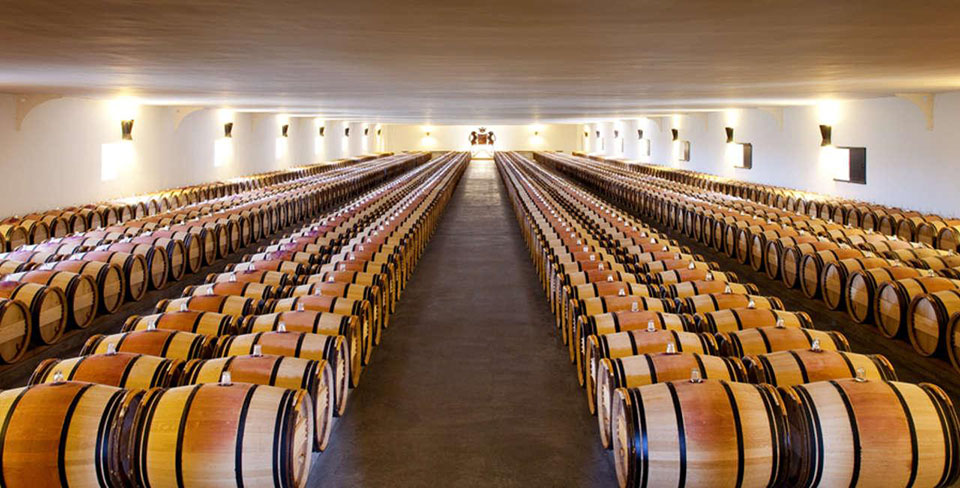
My Scottish grandmother used to tell me that she was related to the renowned poet, Robert Burns. I later discovered that many other Scottish grandmothers make a similar claim. Rabbie Burns as he is known to the Scots, was a contemporary of Mozart and he had a profound influence on Scottish literature. Burns wrote the words of the song Auld Lang Syne which is traditionally sung to bid farewell to the old year at the stroke of midnight on New Year’s Eve. If you hail from the British Isles, you have probably sung it yourself on more than one occasion.
Now you might be wondering why I’m telling all this. (The thought had occurred to me – Ed.) Well, the other day, while browsing the wines at Villa Market, I came across an old acquaintance lying near the bottom of the wine rack. No, not a person, but a bottle of Mouton Cadet, a wine that I’d not tasted since the 1970s. I was pretty much a novice in those days and just starting to learn about wine with the aid of a few books. One of them was High Johnson’s classic, simply entitled Wine and first published in 1966. I still have the 1974 edition which contains many exquisite drawings by Owen Wood. One of the reds I bought regularly was Mouton Cadet, an everyday budget claret which bears the illustrious name of Mouton Rothschild. Even so, many connoisseurs treat Mouton Cadet with a certain disdain, though not with the lofty contempt reserved for things like Liebfraumilch or Mateus Rosé.
Château Mouton Rothschild is a renowned wine estate in the village of Pauillac (poh-yak) about thirty miles north-west of Bordeaux. The estate was established during the 18th century and originally known as Château Brane-Mouton. In 1853, the name was changed to Château Mouton Rothschild and has remained one of Bordeaux’s most esteemed producers. The château makes some of most legendary, expensive, treasured and sought-after wines in the world. However, after the splendid Bordeaux vintages of 1928 and 1929, the weather deteriorated in 1930 and the following couple of years. The resulting lesser-quality wine was deemed unworthy of the Mouton-Rothschild name and the company created a budget wine brand called Mouton Cadet. It quickly became popular in the bistros of Paris.
It was also popular in Britain and America throughout the second half of the 20th century and currently sells in the UK for the equivalent of Bt 600. In the 1970s a white Mouton Cadet appeared followed by a rosé. They’re all made from quality grapes grown in selected Bordeaux vineyards, for blending into to a reliable and consistent wines. Incidentally, the word cadet is an old French term meaning “the youngest son in the family”. For years, I assumed that mouton meant “sheep” but I was disappointed to discover that in this case, it doesn’t. The word evidently derives from the old French mothon, meaning “a rise or mound in the earth”.
Mouton Cadet 90th Anniversary 2020 (red), Bordeaux, France. Bt 859 @ Villa
At the risk of stating the obvious, Mouton Cadet and Château Mouton Rothschild are completely different wines. As you can see from the price, Mouton Cadet is a budget wine whereas a bottle of 2020 Château Mouton Rothschild will set you back about £500 in the UK and would cost considerably more in Thailand, assuming you could find one.
I was eager to be reunited with this old acquaintance. Sporting a lively back and gold label to celebrate 90 years of production, the wine is a dark ruby red and the typical Merlot aroma wafts out the moment you remove the cork. It’s a satisfying aroma of black cherry and blackberry. A bit of air contact reveals secondary aromas of herbs and peppery spices. The wine is a blend of 85% Merlot, 10% Cabernet Sauvignon and 5% Cabernet Franc. It’s known as the Right Bank Bordeaux Blend in which Merlot is the primary or informing grape. And in case you’re wondering, the Left Bank Bordeaux Blend uses Cabernet Sauvignon as the primary grape.
At 14% ABV, the wine has a remarkably smooth body and as dry as they come, with gently firm tannins. It’s medium bodied with plenty of black fruit on the palate, a distinctive touch of acidity and a lingering if slightly austere dry finish. The wine really needs plenty of aeration to show at its best. After half an hour resting in the wine jug, the acidity and tannins softened considerably. Despite the hot weather, I found that the ambient temperature was just about right, because this brought out the fruity character of the wine. It would make an excellent partner for roast pork, lamb chops or any red meat dish.
So how was our reunion? Well, like meeting an acquaintance one hasn’t seen for thirty years, it was not quite as expected. I found the wine a little less refined than I had expected. Mouton Cadet is blended for consistency so the wine doesn’t change very much from year to year. Of course, I’m the one who has changed, not the wine. In the 1970s, I enjoyed vibrant, assertive red wines. These days my taste has shifted slightly towards softer, less dynamic reds. Nevertheless, Mouton Cadet remains one of the classic budget Bordeaux reds and if you’ve never tasted it before, do give it a try. It’ll keep until 2024 if you look after it well.






